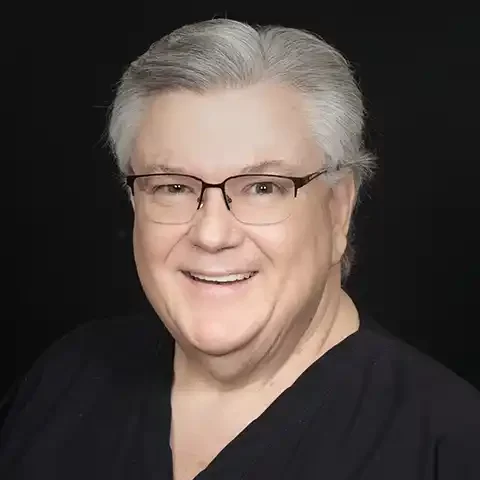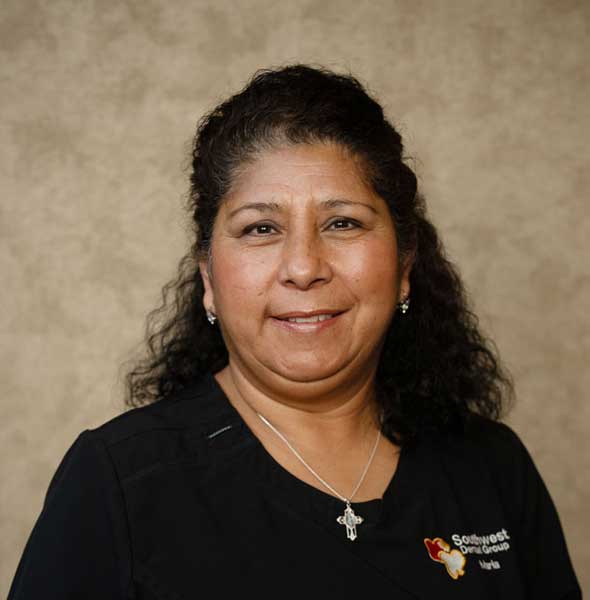
MEET THE TEAM

Dental Hygienist

Dental Hygienist

Dental Assistant

Dental Assistant

Financial Coordinator

Receptionist
Dr. Schick and his team attend multiple hours of continuing education every year to ensure that you have the latest technology, procedural options, and materials available to you. We want the work we do to last a very long time.
If you have multiple missing teeth, we are very experienced in treatment planning, the placement, and restoration of implants.
Call today to reserve an appointment time and get focused on a healthy smile for your entire family.
Dental FAQS
Good oral hygiene starts at home, though it needs to be supplemented by regular visits to Southwest Dental Group. Steps you can take to prevent tooth decay and gum disease include:
Thorough Brushing
Brush at least twice daily using a soft-bristle toothbrush and an ADA-accepted fluoride toothpaste. This helps prevent tooth decay, gum disease, and the need for costly cosmetic or restorative dentistry in the future. Replace your brush every two to three months.
Proper Flossing
Flossing is crucial to the health of your teeth and gums and the prevention of gum disease. When flossing, use an 18-inch strand of floss. Ease the floss between each tooth, then sweep it up and down several times while curving around the tooth at the gum line. Don’t forget to floss behind your last tooth and to floss bridges and artificial teeth with the aid of a floss threader.
Regular Dental Visits
At every regularly scheduled dental appointment at Southwest Dental Group, Dr. Schick will carefully check your teeth, gums, mouth, and throat. A checkup at the Southwest Dental Group office includes:
Regular dental visits, along with a thorough home care regimen, are key to a lifetime of good oral health. General dentistry of this type can prevent the need for cosmetic or restorative dentistry later in life.
Fluoride helps reverse and prevent tooth decay in five ways:
Gum disease has several stages. The initial stage is called gingivitis and is an infection of the gingival (gum tissue). In this stage, gums become red, swollen, and prone to bleeding. The underlying bone is unaffected. In later stages, however, gum disease can lead to bone loss and loosening or even loss of teeth.
Gum disease treatment varies according to the stage of the disease. At its mildest stages, gingivitis can be treated by clearing plaque and tartar deposits from the gum pockets. Severe gum disease, on the other hand, might require treatment that includes bone and gum grafts.
Sensitive teeth can be caused by a range of factors. The porous part of the tooth, called dentin, is the region that registers pain, and dentin can become exposed due to:
Once the cause or causes of bruxism are determined, your dentist can develop a course of treatment. Treatment methods may include:
Bruxism can cause serious pain and headaches, as well as dangerous wear on the teeth. In severe cases, restorative dentistry techniques such as inlays or porcelain crowns are needed to rebuild teeth damaged by bruxism. Therefore, it is crucial to seek treatment for bruxism early to avoid waking up with headaches or jaw pain.
Following a few simple guidelines can help keep your child’s teeth strong and beautiful for life:
Start oral care early
Oral care should start soon after your child is born. After feeding, clean your child’s gums using gauze or a clean, damp cloth. As soon as your child’s teeth appear — as soon as four months after birth — they should be brushed. Each day, brush your child’s teeth with a soft, wet toothbrush and a pea-sized amount of fluoride toothpaste.
Prevent nursing-bottle mouth
Nursing-bottle mouth, also known as baby-bottle tooth decay or baby-bottle syndrome, can cause a baby’s front teeth to rapidly decay, which can lead to a lifetime of dental difficulties. Preventing nursing bottle mouth is easy: If you give your baby a bottle at nap or bedtime, simply fill it with plain water rather than formula, milk, or juice—never let your child fall asleep with a bottle filled with a liquid other than water. In addition, check your child for brown spots near the gums because they are a warning sign for tooth decay.
Take your child to the dentist
General, preventative dentistry should start early. A child’s first dental visit should take place at 6 to 12 months after birth. Regular fluoride treatments, administered by a dentist, are especially helpful in strengthening enamel and arresting tooth decay for children. Contact our general dentistry practice today to schedule an appointment for your child.
Take advantage of dental sealants
Dental sealants are a popular and effective way to protect your child’s teeth against cavities.
Teeth whitening is a conservative method for completely making over your smile.
In-Office teeth whitening procedures are performed with a specially formulated peroxide gel that allows oxygen to permeate your tooth enamel, lifting stains. The structure of your tooth enamel is not affected. The most common side effect is temporary tooth sensitivity.
Luckily, your options for correcting crooked teeth mean you don’t have to endure the uncomfortable metal braces of the past!
Numerous other cosmetic dentistry techniques exist that can provide “instant orthodontics” that require no braces at all. Composite bonding and the application of porcelain veneers are both conservative ways to mask the appearance of crooked teeth. Be aware that these cosmetic approaches cannot address orthodontic issues such as an overbite, underbite, or crossbite, and therefore are not suitable for every patient.
If you have crooked teeth and would like to achieve a more beautiful smile through premier cosmetic dentistry treatments, visit us for a free consultation. At this meeting, one of our dentists will diagnose your specific issues and recommend a course of treatment.